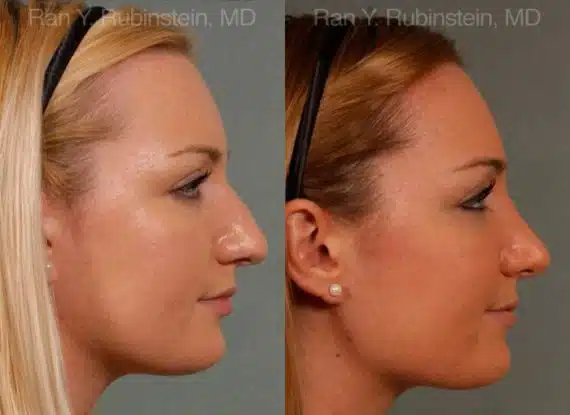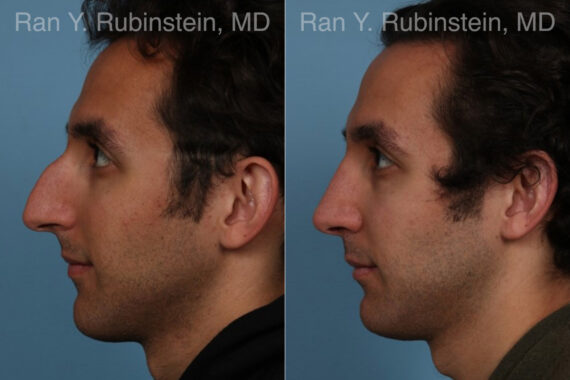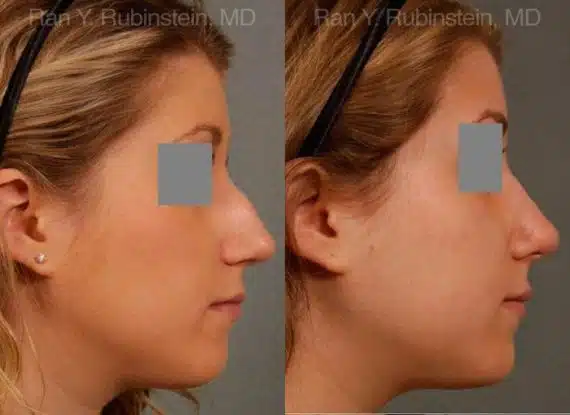Breathing impairments, nasal bone defects, and cosmetic issues are equally valid concerns, and rhinoplasty can help you feel more comfortable and confident about your appearance so you can live your life to the fullest.
However, because rhinoplasty takes place in such a sensitive and confined area of the face, it requires exquisite attention to detail and fine surgical motor control. The surgeon you choose can differentiate between a successful nose job and one needing revisions. Learn what you need to know about rhinoplasty to decide if this is the right procedure for you.
Expert Nose Reshaping with Dr. Rubinstein
Patients in good general health with realistic surgical expectations are likely good candidates for rhinoplasty. Patients interested in changing their appearance or improving their breathing issues can request a consultation to learn if they qualify for surgery.
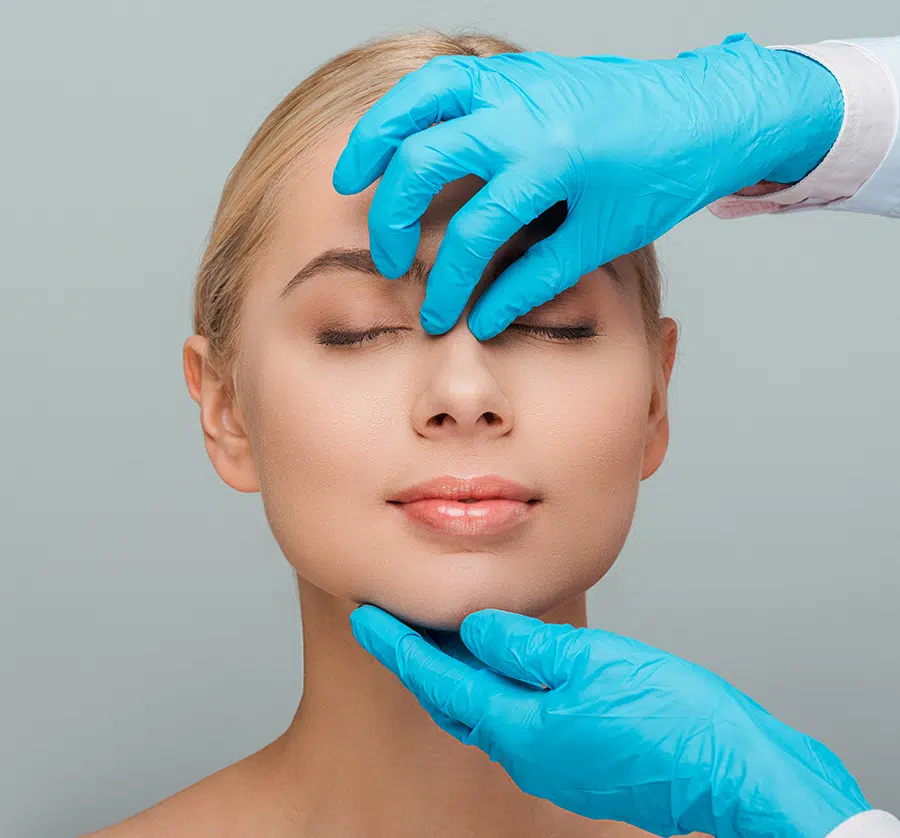
YOUR RHINOPLASTY CONSULTATION
Your consultation is an essential step in your procedure. At your consultation, you will have a one-on-one session with Dr. Rubinstein, where you will share your desires and goals. For example, you should change the shape of your nose, improve your breathing, or address both functional and cosmetic issues.
Dr. Rubinstein will examine your nose, review your medical history, discuss your concerns, and answer all of your questions.
Next, he will take some before photos, which he will use to create a detailed, computer-generated 3-D model of your facial structure. This model will be used to pre-plan the details of your procedure.
To See More Before & After Pictures Visit our Gallery of Patient Results
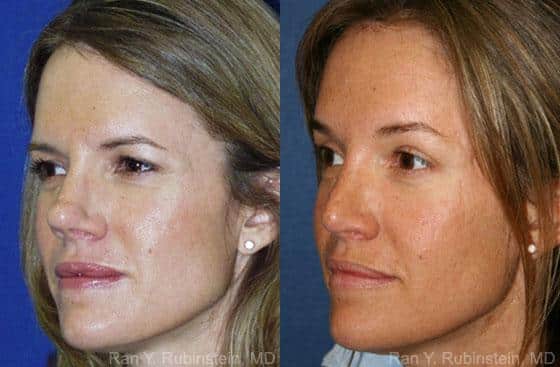
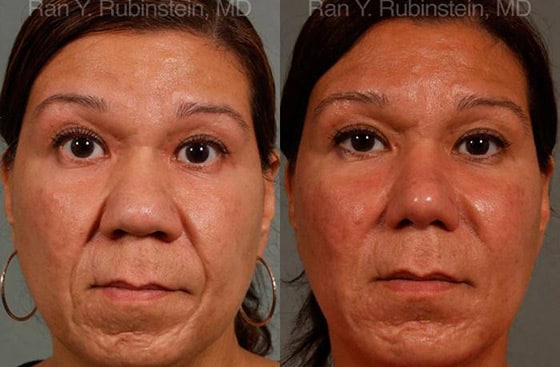
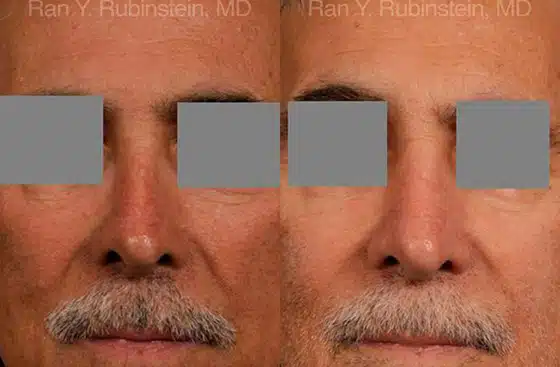
* All patients are unique and individual results may vary.

The Rhinoplasty Procedure – Nose Surgery
Rhinoplasty is defined as surgical alteration or correction of the nose. Rhinoplasty can address many areas of the nose, including the tip of the nose, the nostrils, the nasal passages, the bridge (nasal bones area), the slope, and much more.
The scope of each person’s rhinoplasty procedure will differ significantly, depending on each patient’s facial structure, needs, and goals. When you talk with Dr. Rubinstein in detail about your needs and goals, he will design a procedure that is ideally suited for you.
Open vs. Closed Rhinoplasty?
Dr. Rubinstein prefers to perform endonasal also known as “closed” rhinoplasty as there is no external scar along the columella. The closed approach is more difficult to teach and perform which is why it’s not utilized by all surgeons. There are other reasons that the closed approach is advantageous. The skin covering is left in place allowing for more precise assessment of changes that are being made. Healing time is often reduced with less swelling. Dr Rubinstein will use an open approach in select cases such as revision surgery or patients with severe asymmetries.
Preservation vs. Structured Rhinoplasty?
There are many advances that have been made in rhinoplasty surgery. There is a new emphasis on “preservation” over “resection” or cutting out of excess cartilage and bone. Nasal refinements are performed through cartilage and bone reshaping. Preserving cartilage and bone results in a more natural result with less risk of delayed collapse years later requiring revision.
Structured rhinoplasty is a technique where cartilage grafts are added to the nose. Cartilage can be obtained from the septum, ear, or rib. Indications include increasing tip projection and definition in thicker skinned patients (ethnic rhinoplasty), treating asymmetries, functional and revision surgeries. Structured rhinoplasty is often combined with preservation techniques in ethnic rhinoplasty.
POWERED INSTRUMENTATION IN RHINOPLASTY
The use of powered instruments in rhinoplasty instead of older chisel and hammer techniques to reshape the nasal bone can be more precise, less traumatic, and result in less downtime. This approach is ideal in patients with asymmetries or who only need mild to moderate changes.
Why Choose
Dr. Rubinstein
- Dr. Rubinstein is one of the top facial plastic surgeons in New York & New Jersey.
- He is double board certified by the American Board of Facial Plastic Surgery and the American Board of Otolaryngology-Head and Neck Surgery.
- Dr. Rubinstein has been in both private and academic practice for over 20 years.
- He is also an active member of the American Society for Laser Medicine & Surgery.
- Clinical Professor at New York Presbyterian Hospital.
Related Articles
Rhinoplasty Frequently Asked Questions
If you are considering nose surgery, you probably have lots of questions. Below are some of our patients’ most commonly asked questions.

